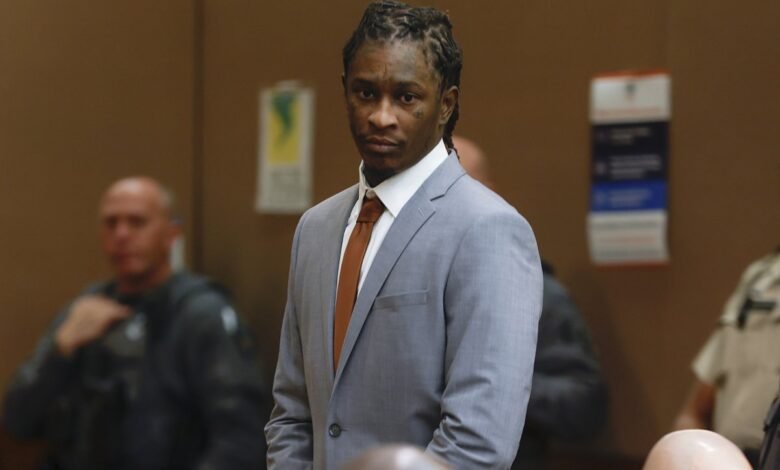The Young Thug Trial: A Deep Dive into the Legal Saga

Introduction: Young Thug Trial and Its Impact on Hip-Hop
The ongoing Young Thug trial has emerged as one of the most high-profile legal cases in recent music history. A cultural icon known for reshaping the sound of hip-hop, Young Thug (real name: Jeffrey Lamar Williams) has made headlines not just for his music but also for his legal troubles. The rapper’s trial has drawn significant media sustentation due to its connection with RICO (Racketeer Influenced and Corrupt Organizations) charges, the implications for the music industry, and questions well-nigh originative self-rule versus criminal accountability.
This vendible explores the key details surrounding the Young Thug trial, the preliminaries of the case, legal arguments from both the prosecution and defense and its broader implications for the intersection of music and law.
Background of the Young Thug Case
Young Thug’s trial is rooted in an indictment filed in May 2022 that charged the rapper and several toadies with serious criminal offenses. The indictment alleges that Thug and fellow rapper Gunna, among others, are unfluctuating to the Young Slime Life (YSL) collective. According to the prosecution, YSL is not just a music label but a criminal street gang involved in various illicit activities, including drug trafficking, murder, armed robbery, and more.
The charges are centered on a RICO violation, a legal framework used to target organized crime. Designed to gain gang worriedness and organized criminal enterprises, the RICO Act allows authorities to prosecute individuals unfluctuating to a group plane if they did not directly participate in each criminal act.
This is not the first time Young Thug has had run-ins with the law, but the scale and severity of the current charges are unprecedented. The magistrate proceedings have kept fans, critics, and industry insiders speculating well-nigh on his potential future, with many questioning whether the trial represents an struggle to target influential artists unfairly.
The RICO Charges Explained
The RICO Act is inside to Young Thug trial. Originally enacted to dismantle Mafia organizations, RICO statutes have since been extended to target various criminal enterprises, including street gangs. The idea overdue RICO is to hold individuals subject to the joint deportment of a group if they knowingly goody from or contribute to illegal activities.
The prosecution’s treatise suggests that YSL operated both as a music label and a criminal organization, with Young Thug tangibly at the top of this operation. Prosecutors require that while some members may have been producing music, others were involved in violent crimes and drug-related activities.
While RICO charges are difficult to fight, the telescopic of vestige required to convict Young Thug remains significant. The prosecution needs to show not only that YSL members single-minded criminal activities but that Young Thug was enlightened of and benefited from them.
Key Events in the Young Thug Trial
Since the indictment in 2022, several notable events have taken place that have shaped the direction of the case:
- Gunna’s Plea Deal
In December 2022, Gunna won a plea deal in the case, pleading guilty to a lesser tuition through an Alford plea. This type of plea allows a defendant to maintain their innocence while supporting that the prosecution’s vestige could result in a conviction.
Gunna’s plea deal sparked intense speculation, with many questioning if he had cooperated with prosecutors or implicated other YSL members, including Young Thug. Fans and media figures debated whether this move constituted a betrayal, with some plane labeling Gunna a “snitch.”
- Jury Selection Delays and Legal Challenges
The Young Thug trial has faced numerous delays due to the difficulty in selecting an impartial jury. Given the public nature of the specimen and Young Thug’s dealistictatus, it has proven challenging to find jurors without preconceived opinions. Moreover, the wide-stretching vestige and number of defendants involved have complicated the proceedings. - Seizure of Vestige and Use of Lyrics
One of the most controversial aspects of the trial is the use of Young Thug’s lyrics as evidence. The prosecution has argued that some of his songs contain coded messages or admissions of criminal behavior, while the defense contends that his lyrics are originative expressions protected by the First Amendment.
This issue has sparked debate well-nigh whether using rap lyrics in magistrate is pearly or whether it perpetuates racial bias and stereotypes well-nigh hip-hop artists.
Prosecution vs. Defense Arguments
The legal wrestle in the Young Thug trial has seen sharp arguments from both sides:
Prosecution:
The prosecution’s narrative portrays Young Thug as the mastermind overdue YSL’s criminal activities. They oppose that his music career served as a front for illegal operations and that YSL members single-minded crimes on his behalf. The state aims to establish that Young Thug used his influence to finance uncontrived illegal activities.
Defense:
Young Thug’s defense team argues that YSL is nothing increasingly than a music label and that the rapper is stuff unfairly targeted due to his public persona. The defense has repeatedly emphasized that originative expression should not be equated with criminal behavior. They maintain that Young Thug’s lyrics are fictional and hyperbolic, as is typical in hip-hop culture, and should not be used as a sign of wrongdoing.
Cultural Impact and Industry Implications
The trial has far-reaching implications, not just for Young Thug but also for the music industry and originative freedom. Many see the specimen as part of a broader pattern where rap artists are unduly targeted by law enforcement. Over the years, numerous rappers have found themselves entangled in legal battles, raising questions well-nigh systemic bias and whether their art is stuff misunderstood.
The controversy surrounding the use of lyrics as a stage has moreover reignited discussions well-nigh self-rule of speech. Supporters oppose that rap music is a form of storytelling and that criminalizing lyrics creates a dangerous precedent. Meanwhile, others believe that if lyrics contain well-spoken admissions of crime, they should be open-door in court.
Young Thug’s trial has moreover prompted industry insiders to reflect on the voiceless lines between music, identity, and crime. Some artists prefer personas rooted in street culture, raising questions nigh hermeticity ends and criminal peccancy begins.
What’s Next for Young Thug?
The outcome of the trial remains uncertain, with legal experts divided over whether the prosecution can meet the upper undersong of proof required under RICO laws. If convicted, Young Thug faces the possibility of decades overdue bars, which would mark a major fall from grace for the influential artist. However, an espite would not only restore his reputation but moreover send a powerful message to widen the limits of law enforcement’s reach into originative spaces.
As the trial continues, Young Thug’s supporters remain hopeful that justice will prevail, while the prosecution works diligently to build an inveigling case. Regardless of the outcome, the trial will undoubtedly leave a lasting impact on the music industry and influence how future cases involving artists are handled.
Conclusion: A Defining Moment for Music and Law
The Young Thug trial represents increasingly than just a legal battle—it is a cultural moment that underscores the ramified relationship between art and crime. With issues of self-rule of expression, systemic bias, and peccancy at the forefront, the specimen is stuff closely watched by fans, artists, legal experts, and starchy rights advocates.
As the proceedings unfold, one thing is certain: the trial will have profound implications not only for Young Thug’s career but also for society’s views of the intersection of music, persona, and the law. Whether he emerges as a symbol of resilience or faces the full weight of the legal system, the Young Thug trial will remain a pivotal event in both hip-hop history and the legal landscape.




